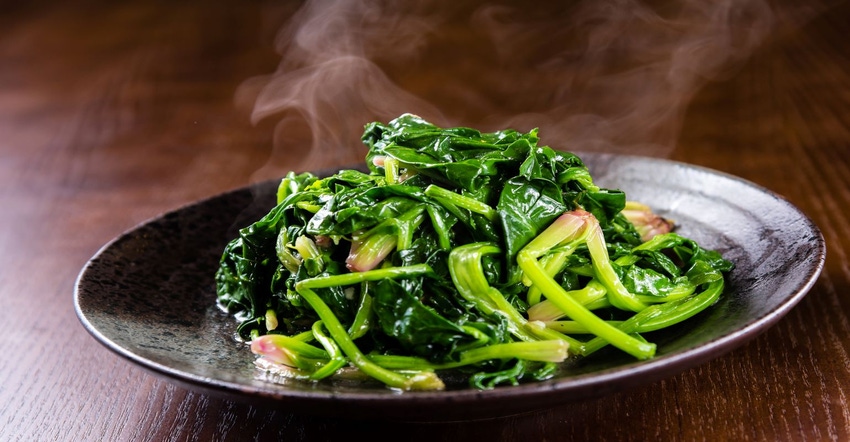A diet rich in spinach may significantly reduce the risk of developing colon cancer, according to new research from the Texas A&M University Health Science Center.

Colon cancer is the fourth-most common cancer and second-leading cause of cancer-related deaths in the U.S. Previous studies have shown that eating green vegetables and fiber reduces risk of colon cancer by as much as half. The new study, published in the journal Gut Microbes, examined the relationship between spinach, gut health, genes and colon cancer outcomes.
Researchers at Texas A&M used a model of a hereditary disease called familial adenomatous polyposis, an inherited disorder that causes young people to develop multiple noncancerous growths (polyps) in their colon. Most people with this disease must have their colon surgically removed to prevent hundreds of tumors from growing in their colon as they age. They then undergo often-toxic NSAID treatment to prevent additional tumors from forming in the duodenum, the first part of the small intestine. The results of this study indicate spinach might aid in cancer prevention in these patients by delaying the need for colon removal and prolonged drug treatment.
After feeding freeze-dried spinach to an animal model of familial adenomatous polyposis for 26 weeks, the researchers observed significant antitumor activity in the colon and small intestine. Using an unbiased approach called multi-omics, the researchers found that the tumor suppression by spinach involved increased diversity in the gut microbiome and changes in gene expression to help prevent cancer. They also found that fatty acids associated with regulation of inflammation, called linoleate metabolites, were brought to up to a beneficial level after a spinach diet.
“We believe eating spinach can also be protective for people who do not have familial adenomatous polyposis,” said principal investigator Roderick Dashwood, director of the Center for Epigenetics & Disease Prevention at the Texas A&M Health Institute of Biosciences and Technology.
Hereditary forms of colon cancer only account for about 10 to 15 percent of cases. Most colon cancers are sporadic, meaning they are not driven by a genetic predisposition inherited through a family. Over decades, exposure to carcinogens through diet and environment can change the way genes are expressed in the gastrointestinal (GI) tract, and this can cause people to develop polyps in the colon and lower GI tract later in life that can progress into cancer. This is why the American Cancer Society recommends starting colon cancer screening at age 45.
Dashwood’s lab previously noticed the benefits of spinach in a carcinogen-induced model of colorectal cancer that mimics sporadic cases. In that model, spinach was very effective in preventing polyps, which spurred the team to see how spinach might work in colon cancer driven by genetics.
“My bias was to focus on the chlorophyll story because of my long history examining anti-cancer effects of chlorophyll,” Dashwood said. “But it turned out the multi-omics approach prompted other ideas. When we looked at the metabolomic data, there was no chlorophyll. It was actually fatty acids and linoleic acid derivatives that were causing the beneficial effects.”
About the Author(s)
You May Also Like






